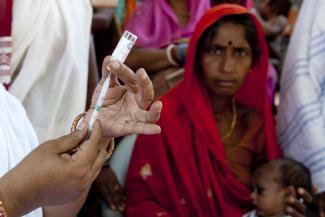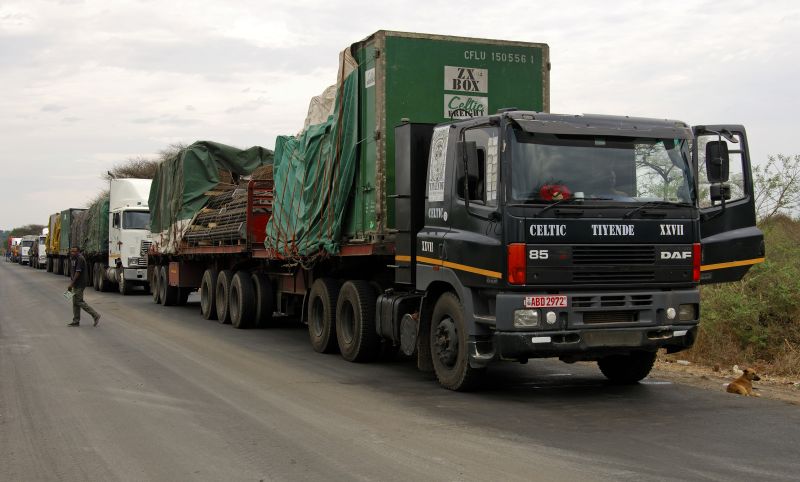Interview
“Don’t keep reinventing the wheel”

To what extent is the activists’ criticism correct?
Well, partnerships are based on win-win constellations that should offer advantages to all sides. Different partners’ interests are obviously not identical. Yes, businesses want to make money and improve their public image. And there is nothing wrong with that – unless it is inconsistent with the common goals. The key issue is whether there is a developmental advantage for the local people.
Is such an advantage guaranteed?
No, it is not always delivered. In your August issue, Marita Wiggerthale of Oxfam sharply criticised the German Food Partnership (GFP), and one can certainly question whether the GFP is optimally geared to helping poor farming communities in developing countries. But it is wrong to generalise such criticism and assume that the entire partnership approach is inappropriate because some of them have weaknesses.
What needs to happen for a partnership to work out well?
In general, the choice of the partnership approach should not distract from the fact that governments have a special responsibility and that multilateral agreements are binding. In PPPs, government agencies are not equal partners among others. They bear the ultimate responsibility for ensuring that the regulatory environment is appropriate and that human rights commitments are fulfilled.
Moreover, all partners must learn from experience. It is important to diligently design a partnership, monitor its performance continuously, evaluate the results and so on. Multi-stakeholder partnerships must be learning organisations. Local knowledge, in particular, needs to be incorporated from the outset.
If these requirements are met, PPPs can indeed deliver added value. Critics often overlook the fact that the entire concept only evolved because of widespread dissatisfaction with the performance of governments or the implementation of multilateral agreements. That was not just due to weak statehood and dysfunctional governance in developing countries. Donor countries have also failed to keep promises. Examples include the failures to reduce climate emissions in line with the Kyoto Protocol or to live up to the old pledge to spend 0.7 % of GNP on official development assistance (ODA). In view of all the shortcomings, however, we must harness whatever will contribute to bringing the necessary transformative change to achieve sustainable development. So if partnerships make a positive contribution to that goal, the opportunity must be grasped.
What is the success rate?
Partnerships were invited to register with a database at the UN Commission on Sustainable Development. Academic studies show that around a third of the more than 345 partnerships listed are no longer operational, and another third did not produce much of real value. The remaining third, however, achieved their targets. This third includes some very innovative partnerships. We need to analyse their success factors so the model will be upgraded and further developed.
What sort of things are PPPs good for?
There are basically three different types of partnerships, and successful examples can be cited for all of them:
- Partnerships can serve to provide services and implement projects. Good examples are the vaccine alliance GAVI and the Global Fund to Fight AIDS, Tuberculosis and Malaria.
- Partnerships can also be used to share knowledge and experience. The Global Compact, for example, offers private-sector companies trainings in human-rights issues, and the Global Water Partnership promotes integrated water-resource management.
- Finally, partnerships can define voluntary standards and certify compliance in areas where binding regulations are lacking. This is what the Forest Stewardship Council does for example.
Partnerships offer an added value if there is a win-win constellation and if all partners need one another to make the most of it.
How must a partnership be organised in order to operate well?
That depends largely on what it is supposed to achieve. Where projects and services are to be delivered, local needs and circumstances must be understood and taken into account. For successful knowledge exchange, on the other hand, attractive and open platforms are the prime requirement. As for standard-setting and certification, the important issue is to involve, to the extent possible, all actors that are supposed to observe the voluntary standard. There is no single blueprint for all partnerships because they are very diverse. What all partnerships need, however, is a shared vision and long-term commitments. And sufficient funding must be available too. This is needed for professional management, strong capacity development, and for enabling systematic learning from experience.
Germany’s Federal Ministry for Economic Cooperation and Development is currently engaged in a broad public consultation to draft a charter for the future entitled “One World – Our Responsibility”. In this context, you are the expert on global partnerships. How does the development community in Germany see the matter?
Most tend to be quite sceptical – which is understandable after the hype that surrounded partnerships for a while. In view of the mixed results, some caution is certainly advisable. At a forum on partnerships we held in Bonn in September, however, participants showed also keen interest in successes. The SEED Initiative was well received for example. This partnership invites project proposals from small and medium-sized enterprises in developing countries and provides them with funding if the projects serve sustainable development. In Kenya, for instance, SEED has supported EcoPost, a local company that makes fence posts from plastic waste. EcoPost is creating jobs, collecting garbage, recycling it, and contributing to curbing deforestation. People are interested in partnerships like that.
What is your advice to the Federal Government?
Don’t keep reinventing the wheel. We need to learn from positive and negative experiences and create a framework in which future partnerships will have a maximum impact for sustainable development.
Questions by Hans Dembowski.
Marianne Beisheim works for SWP (Stiftung Wissenschaft und Politik), the German Institute for International and Security Affairs. She is the convening adviser on global partnerships in the Federal Ministry for Economic Cooperation and Development’s initiative to draft a Charter for the Future (Zukunftscharta).
marianne.beisheim@swp-berlin.org
http://www.zukunftscharta.de










